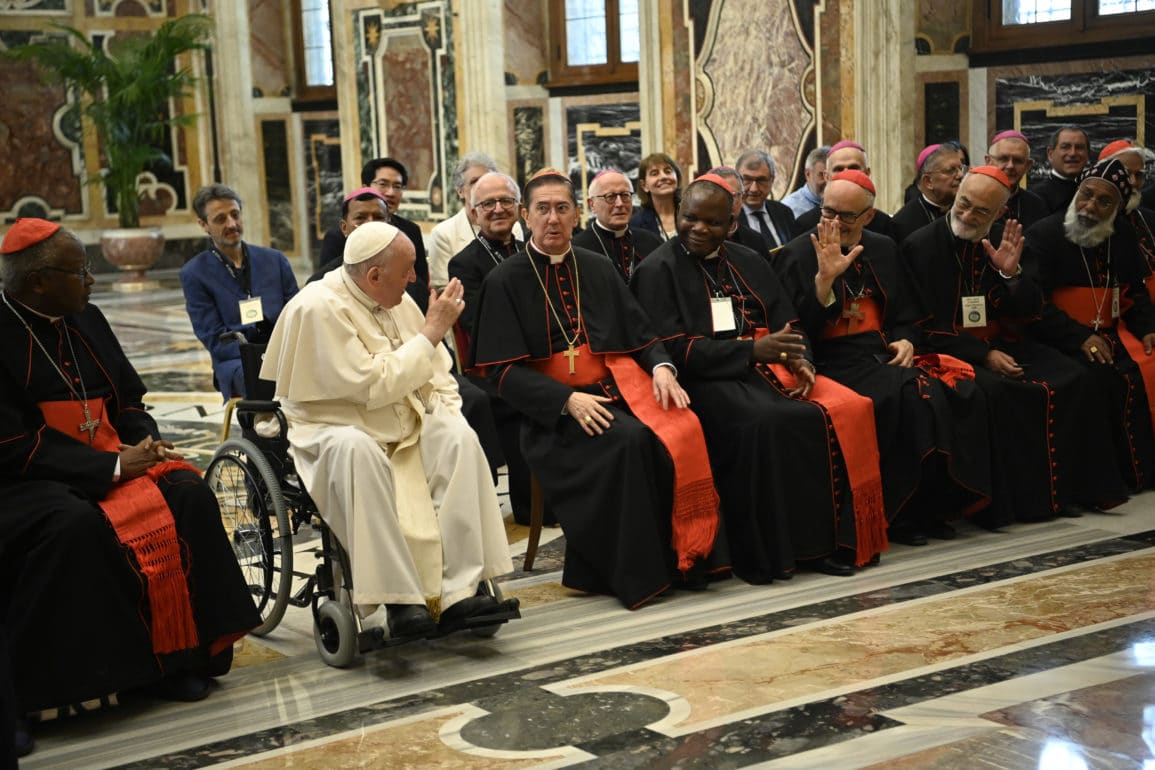This Monday, June 6, 2022, at the Vatican Apostolic Palace, the Holy Father Francis received in audience the participants in the Plenary Session of the Dicastery for Interreligious Dialogue and addresses them the speech that we publish below:
Speech of the Holy Father
Dear Cardinals,
Dear brothers in the episcopate,
Dear sisters and brothers!
I warmly welcome you and I thank Cardinal Miguel Ángel Ayuso Guixot for the words he addressed to me on behalf of you all. I am pleased to meet you on the occasion of the Plenary Session of the Dicastery for Interreligious Dialogue, the day after the solemnity of Pentecost.
I emphasize this because Saint Paul VI announced the birth of the “Secretariat for non-Christians” in his homily on the day of Pentecost 1964, during Vatican Council II. He did so before the promulgation of the Declaration Nostra aetate on the relations between the Church and non-Christian religions, and before the Encyclical Ecclesiam suam, considered the magna charta of dialogue in its various forms. How far the Spirit has brought us in these sixty years! Pope Paul VI’s intuition was based on the awareness of the exponential development of relations between people and communities of various cultures, languages and religions – an aspect of what today we call globalization – and posited the Secretariat “in the Church as a visible and institutional sign of dialogue” with people of other religions (Address to Members and Consultors of the Secretariat, 25 September 1968). This was on 25 September 1968.
The Apostolic Constitution Praedicate Evangelium on the Roman Curia has just come into effect, and this area of its service to the Church and the world has lost none of its relevance. On the contrary, globalization and the acceleration of international communications make dialogue in general, and interreligious dialogue in particular, a crucial issue. I think it is very appropriate that, for this Plenary, you have chosen the theme Interreligious Dialogue and Conviviality, at a time when the whole Church wants to grow in synodality, to grow as a “Church of mutual listening in which everyone has something to learn” (Praedicate Evangelium, 4). Together with the entire Curia, you will thus be able to make your own “the paradigm of the spirituality of the Council expressed in the ancient story of the Good Samaritan”, according to which “the face of Christ is found in the face of every human being, especially the suffering man and woman” (ibid., 11).
Our world, increasingly interconnected, is not equally fraternal and convivial, quite the contrary! In this context, your Dicastery, “aware that interreligious dialogue is made tangible through action, theological exchange and spiritual experience … promotes the true search for God among all people” (ibid., 149). This is your mission: to promote, with other believers, in a fraternal and convivial manner, the journey in search of God; considering people of other religions not in an abstract way, but in a real sense, with a history, desires, sufferings, and dreams. Only in this way can we build together a world everyone may inhabit in peace. Faced with a succession of crises and conflicts, “some people attempt to flee from reality, taking refuge in their own little world; others react to it with destructive violence. Yet ‘between selfish indifference and violent protest there is always another possible option: that of dialogue” (Encyclical Letter Fratelli tutti, 199).
Every man and every woman are like tesserae in an immense mosaic; they are already beautiful in their own right, but only together with other tesserae do they compose an image, in the conviviality of differences. Being convivial with someone also means imagining and building a happy future with the other. Indeed, conviviality echoes the desire for communion that resides in the heart of every human being, thanks to which all people can speak to each other, exchange projects and outline a future together. Conviviality unites socially, but without colonizing the other and preserving his or her identity. In this sense, it has political relevance as an alternative to social fragmentation and conflict.
I encourage all of you to cultivate the spirit and style of conviviality in your relations with people of other religious traditions: there is a great need for this today in the Church and in the world! Let us remember that the Lord Jesus fraternized with all; he associated with people considered to be sinners and impure, and shared without prejudice the table of the publicans. And it was again during a convivial meal that he showed himself to be a faithful servant and friend to the end, and then as the Risen One, the Living one who gives us the grace of universal conviviality. This is the word I would like to leave with you: conviviality.
Dear brothers and sisters, thank you for your work, especially that which is most concealed, less conspicuous, and at times perhaps even a bit boring. May Our Lady accompany you and keep you in full docility to the Holy Spirit. I bless each one of you, and your family members, from my heart. And I ask you, please, to pray for me. Thank you!
© Vatican Publishing Bookstore










